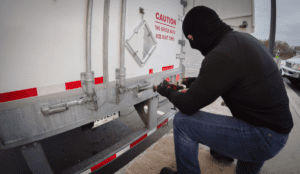 Cargo theft continues to be a problem, especially around the holidays. And I don’t just mean the winter holidays; cargo theft typically spikes during any holiday season where businesses may be closed for an extra day or two. But what exactly is cargo theft? I found a very detailed definition on the Texas Department of Public safety website. Cargo theft is “the criminal taking of any cargo including, but not limited to, goods, chattels, money, or baggage that constitutes, in whole or in part, a commercial shipment of freight moving in commerce, from any pipeline system, railroad car, motortruck, or other vehicle, or from any tank or storage facility, station house, platform, or depot, or from any vessel or wharf, or from any aircraft, air terminal, airport, aircraft terminal or air navigation facility, or from any intermodal container, intermodal chassis, trailer, container freight station, warehouse, freight distribution facility, or freight consolidation facility.” Basically, when cargo is stolen, either by an individual or as part of a larger organized crime syndicate, it is cargo theft.
Cargo theft continues to be a problem, especially around the holidays. And I don’t just mean the winter holidays; cargo theft typically spikes during any holiday season where businesses may be closed for an extra day or two. But what exactly is cargo theft? I found a very detailed definition on the Texas Department of Public safety website. Cargo theft is “the criminal taking of any cargo including, but not limited to, goods, chattels, money, or baggage that constitutes, in whole or in part, a commercial shipment of freight moving in commerce, from any pipeline system, railroad car, motortruck, or other vehicle, or from any tank or storage facility, station house, platform, or depot, or from any vessel or wharf, or from any aircraft, air terminal, airport, aircraft terminal or air navigation facility, or from any intermodal container, intermodal chassis, trailer, container freight station, warehouse, freight distribution facility, or freight consolidation facility.” Basically, when cargo is stolen, either by an individual or as part of a larger organized crime syndicate, it is cargo theft.
Cargo theft comes in many shapes and sizes. According to Travelers Insurance, there are five main cargo theft tactics to watch out for. The first is straight cargo theft, where cargo is physically stolen from a location. Second is strategic cargo theft, which uses deceptive means to commit theft, including the use of fraud and deceptive information to trick brokers into giving up a load. Third is the use of technology, such as GPS blockers to hide the location of a stolen container or truck. Fourth is the use of cyber-attacks, such as phishing scams and malware used to access sensitive data. And fifth is pilferage, which is the theft of small quantities of items that are often overlooked until a trailer or container is unloaded.
As supply chain woes continue to drag on and the backlogs at ports remain long, the threat of cargo theft is increasing. Generally speaking, the longer cargo is left to sit, the greater the chance for theft. And with the ongoing semiconductor shortage, certain electronics are in higher demand. It also means that the prices and values of certain electronics that require chips such as gaming consoles, are increasing. Higher value goods are always a draw for cargo thieves, and as the items continue to sit, they become a bigger target.
According to CargoNet, a division of Verisk Analytics, which tracks thefts along the supply chain for companies, roughly $45 million in cargo thefts were reported through September. That compares with almost $68 million for all of 2020 when thieves targeted toilet paper and personal protective equipment. But with port backlogs, and the holiday season in full swing, the amount of theft for 2021 is likely to rise.
California topped the list of states with the most reported cargo thefts, followed by Texas and Florida. On the West Coast, the computer chip shortage has resulted in higher thefts of electronics. On the East Coast, refrigerated trucks used to transport food have been a prime target for cargo thieves this year.
Cargo thieves have been more cautious this year, relying more on pilferage that taking the entire truck or container. Organized theft rings will steal a few items at different stops along the way, making it much more likely that the driver will not notice any missing items until they get to the final stop. For interstate loads, there is no way for the driver to know where the item was stolen, making it harder to even notify the proper authorities.
To help reduce the threat of cargo theft, and a potentially disappointing holiday season, CargoNet does offer some sage advice. First, companies can improve their security initiatives by arranging for same-day delivery of short-haul shipments, rather than multi-day shipments. This will reduce idle time of the container. Second, companies can embed covert tracking devices, and look at ways to disrupt GPS jammers. Companies can also use high-security locks to prevent trailer burglaries. The final piece of advice is for the drivers themselves. Drivers should not leave their vehicles or shipments unattended and should be on the lookout for any vehicles that appear to be following them. The ongoing supply chain disruptions mean that cargo theft is likely to continue at higher rates. But by following the above advice, it can be experienced to a lesser degree.

















